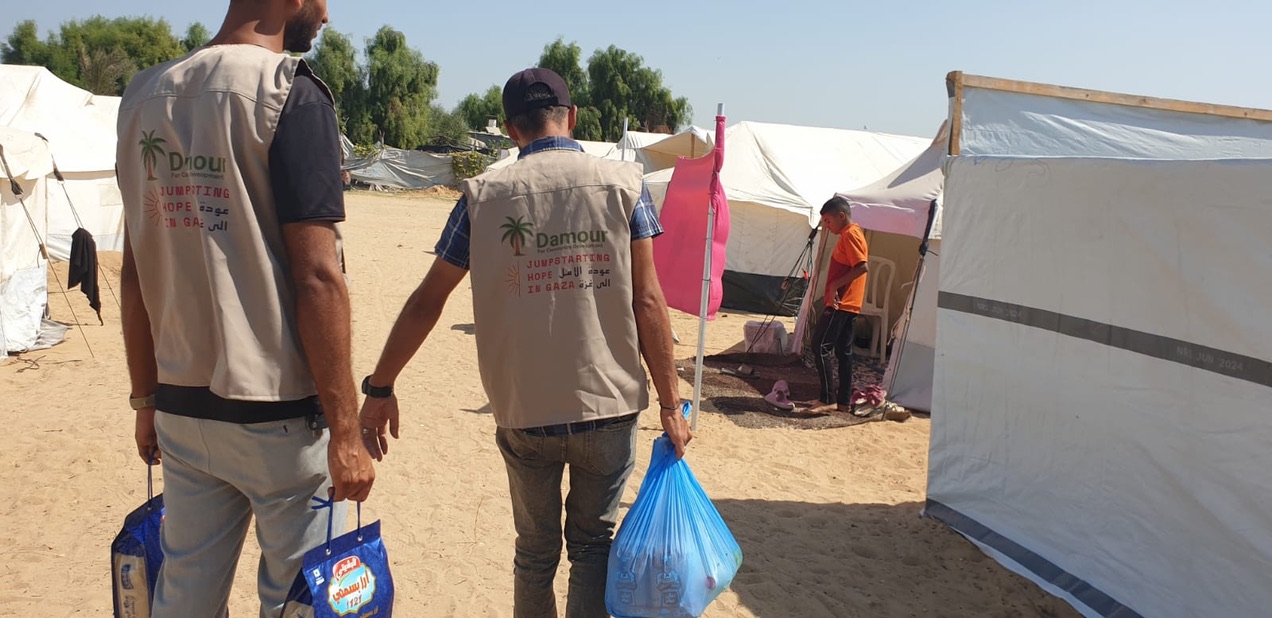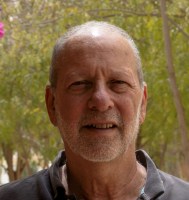The Israel-Palestine conflict has brought immense pain and suffering to the peoples of both nations. Violence between Israelis and Palestinians has created intense anger and desires for revenge. Hamas’s attack on Israel on October 7, 2023 and Israel’s subsequent war in the Gaza strip have exacerbated such emotions even more, with mistrust and division festering.
However, one glimmer of hope is that partnerships between Israeli and Palestinian organizations have managed to remain intact in the two years following October 7. Although it hasn’t always been easy, Israeli and Palestinian organizations have successfully continued to collaborate on environmental projects to help better the lives of people in rural West Bank communities, and the Gaza Strip.
In 2017, the Arava Institute for Environmental Studies in Israel— which works to advance cross-border environmental cooperation in the face of political conflict— and Damour for Community Development (DCD)— a Palestinian NGO promoting sustainable development in underserviced Palestinian communities—agreed to cooperate on environmental initiatives to improve natural resource management and supply in rural communities. The initiatives aimed to demonstrate that Palestinians and Israelis can work together on mutual environmental concerns, and prove that there are partners for peace on both sides.
From 2017 to 2023, under the “Track II Environmental Forum”—established by the Arava Institute to identify cross-border environmental challenges that both sides have an interest in addressing—Damour and the Arava Institute worked together to solve these challenges. To address the lack of potable water in Gaza, the Track II Environmental Forum introduced atmospheric water generators which take humidity out of the atmosphere and turn it into high quality drinking water. To address the lack of wastewater treatment and reuse in the West Bank, the Track II Environmental Forum introduced wastewater treatment and reuse systems into Palestinian villages, and negotiated a building permit from the Israeli Civil Administration to the Palestinian Water Authority for a treated wastewater trunkline to bring agricultural water from the Ramallah area down to the Jordan Valley for Palestinian farmers to use. Permits to build inside of Area C, under Israeli military control, are rarely granted to Palestinian entities.
During this period, the Track II Environmental Forum began to develop a methodology called applied environmental diplomacy, which uses public diplomacy tools to address environmental issues, not just in theory but in practice. The main principles of applied environmental diplomacy are:
Bottom-up – Top-down process – While much of the work of applied environmental diplomacy is focused on stakeholder engagement with local communities, real change will require both grassroots engagement and government engagement.
Build capacity and resilience of municipalities – Local governments, as opposed to national governments, are often more attuned to the environmental needs of residents, because they are closer to the community and more sensitive to the dissatisfaction of residents when environmental services are unreliable.
Engage government officials in being part of the solution – Though the focus of applied environmental diplomacy is on solutions for local communities, national governments should not be ignored, because if they are not co-opted early on to be part of the solution, they will become part of the problem.
Enlist international support through embassies and former diplomats – To prioritize cross-border environmental initiatives, international engagement can provide a motivation for decision makers to remove barriers to implementation. In addition, international organizations and foreign governments can provide funding to increase financial feasibility.
Develop multi-national networks of scientists, practitioners, and emerging leaders (community, women, and youth) – A multi-national network can help to build trust across borders by focusing on practical solutions while building personal relations.
Propose scalable and replicable regional solutions to strategic development goals based on proofs of concept – Building on the success of pilot demonstrations, projects can be scaled and replicated by international donor organizations and national governments. Adoption of ideas and policies developed through an applied environmental diplomatic approach can lead to a more sustainable development and more peaceful relations.
The attack on Israel on October 7, 2023 left many in the region devastated and in shock. The Track II Environmental Forum Steering Committee had a scheduled Zoom call on October 9, two days after the Hamas attack on the Gaza Envelope.
Our Track II Israeli-Palestinian team was not sure we could meet, even virtually, and look each other in the eye. But we decided that despite the conflict, this was not the time to take a step back but a time to take a step forward. We held the virtual call, and although it was very painful, we all agreed that the relationship and trust we had built over six years was too precious to allow it to deteriorate. Instead, we committed to each other to maintain our partnership despite the conflict, and to work together to address the crisis in the region.
Our first mission was to help our Palestinian partners trapped in the war in Gaza to get out. One of our Palestinian partners from Damour, a former minister in the Palestinian Authority, had gone back to visit her family in Gaza just before the war broke out. She eventually was able to leave Gaza but while she was there, organized a network of shelters for displaced persons, as many in Gaza, including herself, lost their homes to bombings.
Soon, our colleague approached us and said that the displacement was not a short-term situation, and that people would be living in displaced persons camps or shelters for a long time before they could move back to permanent housing. She said we needed to build “Green Refugee Shelters,” meaning we needed to find a way to provide a sustainable, secure, and dignified solution for temporary housing of displaced persons for the five to 10 years it may take to rebuild the infrastructure and housing to resettle the millions of displaced Palestinians in Gaza.
We soon launched an initiative called “Jumpstarting Hope in Gaza” to respond to the growing humanitarian and environmental crisis there. It was the first Palestinian-Israeli initiative to supply emergency aid to Gazans during the war. Now that a shaky ceasefire has been declared and a pathway to ending the conflict has been proposed, we hope to implement “Green Refugee Shelters” to provide sustainable, safe, and dignified living conditions with off-grid technologies such as atmospheric water generators, mobile wastewater treatment and reuse systems, and solar energy arrays and batteries.
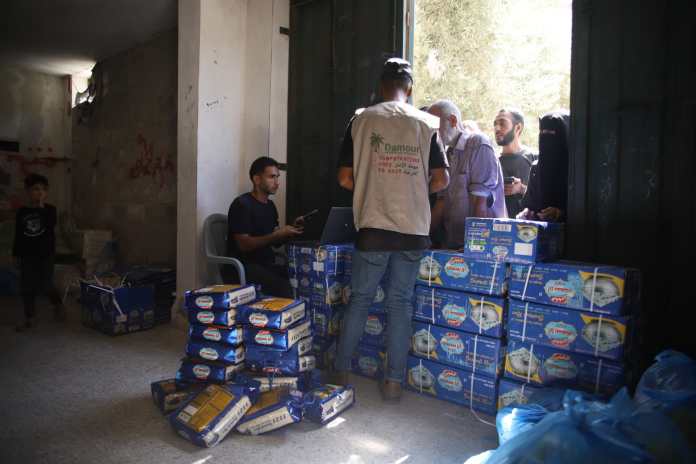 Aid distribution in Gaza, photo of Damour for Community Development (DCD) provided by David Lehrer.
Aid distribution in Gaza, photo of Damour for Community Development (DCD) provided by David Lehrer.
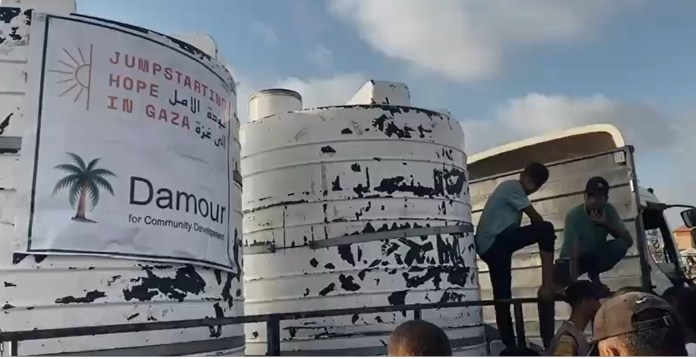 Water trucks, photo provided by David Lehrer.
Water trucks, photo provided by David Lehrer.
Throughout the painful war, the Arava Institute and Damour maintained our partnership because we believe that what unites us is much more important than what divides us. Our partners in Gaza and in Cairo, where many refugees from Gaza are now located, have already begun to think about recovery for Gaza. It is our hope that through applied environmental diplomacy, our demonstration of Palestinian-Israeli partnership inspires people in the region to base recovery on cross-border environmental cooperation and peacebuilding.
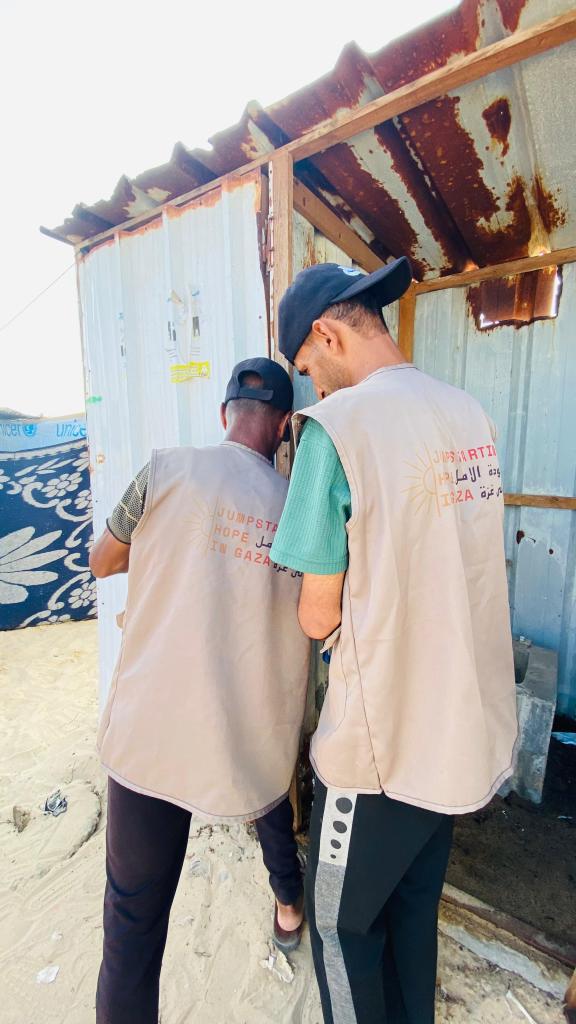 Photo provided by David Lehrer.
Photo provided by David Lehrer.
Keywords: Middle East, Israel, Palestine, Gaza, October 7, environmental diplomacy, environmental, conflict, conflict resolution, peace, diplomacy, humanitarian, green
David Lehrer
Dr. Lehrer holds a PhD from the Geography and Environmental Development Department of Ben-Gurion University of the Negev and a joint Masters Degree in Management Science from Boston University and Ben-Gurion University. Dr. Lehrer is the Director of the Center for Applied Environmental Diplomacy at the Arava Institute for Environmental Studies. Dr. Lehrer has been a member of Kibbutz Ketura since 1981.
